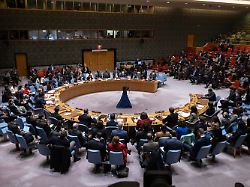USA waives veto
UN Security Council calls for immediate aid corridor to Gaza
December 22, 2023, 7:06 p.m
In recent weeks, draft resolutions calling for more aid to the population in the Gaza Strip have failed due to resistance from the USA, which has opposed clear criticism of Israel’s government. In order to get the superpower to abstain, a lot of compromises are necessary in the decision that has now been made.
After days of struggle, the UN Security Council issued a resolution calling for an increase in humanitarian aid for around two million people in need in the Gaza Strip. The most powerful UN body passed a significantly watered-down compromise text in New York. The USA abstained. Since the beginning of the week, it had appeared that Washington would use its veto power to protect the interests of its ally Israel. However, massive concessions from the negotiators prevented the decision from failing at the last second. A total of 13 of the 15 countries voted for the text, with Russia abstaining along with the USA.
The decision, which is binding under international law, calls on Israel to “immediately enable safe and unhindered humanitarian access” to the Gaza Strip. The conditions must also be created for a sustainable cessation of violence. On the controversial issue of how relief supplies should be monitored, the Council members agreed to appoint a responsible UN coordinator. This should also ensure that deliveries are accelerated in collaboration with all stakeholders.
The Council further demands that humanitarian goods flow into the Gaza Strip through all available border crossings. However, other passages were deleted due to pressure from the USA: A paragraph that condemns “all violations of international humanitarian law, including all arbitrary attacks on civilians and civilian objects” is no longer found in the resolution. The previously requested immediate suspension of violence to enable aid deliveries is also missing. A number of council members were dissatisfied with the text because of the significant weakening.
It remains unclear how much influence the resolution will actually have. Despite its binding nature, the consequences for Israel if it is violated are likely to be manageable. As a result of Israel’s warfare over the past ten weeks, the humanitarian situation for the more than two million people in the Gaza Strip is dramatic. A recent UN study concludes that 577,000 people in the sealed-off coastal strip fall into the most severe category of hunger. In contrast, there are currently 129,000 people in the rest of the world who are at similar risk. Almost everyone in the Gaza Strip is suffering from hunger or displacement. Israel sealed off and attacked the Gaza Strip after the horrific terrorist attack by the Islamist Hamas on October 7th.
Similar designs failed in the USA
The US government in particular had struggled internally for a long time when negotiating the resolution that had been introduced by the United Arab Emirates. According to reports, leading diplomats had already been prepared to abstain at the beginning of the week. But President Joe Biden initially made the decision to veto despite a conversation on Tuesday with UN Ambassador Linda Thomas-Greenfield. But then US Secretary of State Antony Blinken received further concessions in direct talks with his counterparts from the United Arab Emirates and Egypt, according to diplomats.
In recent weeks, two similar draft resolutions failed due to US resistance. Washington has always stood behind Israel and said that advances through a resolution could jeopardize ongoing diplomatic efforts on the ground. So far, the UN Security Council only passed a resolution on the conflict that is binding under international law with a humanitarian focus a few weeks ago. The UN General Assembly, on the other hand, has already called for an end to the violence twice through resolutions. However, the resolutions of this body are not binding, but rather are considered symbolic.
UN Secretary-General António Guterres had also taken unusually strong measures to urge the Security Council to advocate for a humanitarian ceasefire. In a recent letter to the Council, he referred to Article 99 of the UN Charter. This allows the Secretary General to bring to the attention of the Security Council “any matter which, in his opinion, may jeopardize the guarantee of international peace and security” – and, according to the UN, has not been used for decades.
